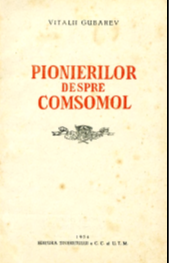

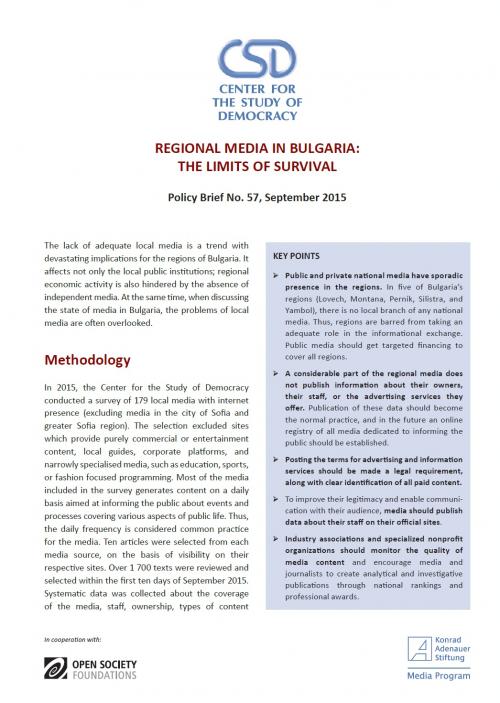
The lack of adequate local media is a trend with devastating implications for the regions of Bulgaria. It affects not only the local public institutions; regional economic activity is also hindered by the absence of independent media. At the same time, when discussing the state of media in Bulgaria, the problems of local media are often overlooked. The current publication presents the results of a survey of 179 local media with internet presence. The analysis focused on the mechanisms and factors that prevent journalists and the media from informing the public in an objective, competent, and comprehensive way.
More...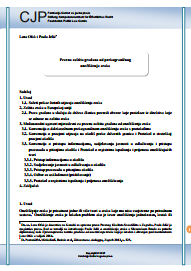
Keywords: Public law; air pollution; transboundary air pollution; citizens; legal protection; legislation; EU legislation; international law; Convention on Access to Information; Public Participation in Decision-making;
This paper deals with the problem of transboundary air pollution. It begins with a brief reference to the harmful effects of air pollution on human health and the environment. Taking into consideration that Croatia joined the EU on 1st of July 2013 and Bosnia and Herzegovina is a potential candidate country, which signed the Stabilisation and Association Agreement on the 16th of June 2008, the paper presents the legal framework of the European Union relating to the air protection. Both Croatia and Bosnia and Herzegovina are signatories to international treaties that are relevant for air pollution. Thus, the paper demonstrates the obligations of States under the Convention on Long-range Transboundary Air Pollution and its Protocols, the Convention on Environmental Impact Assessment in a Transboundary Context and the Protocol on Strategic Environmental Assessment, and the Convention on Access to Information, Public Participation in Decision-making and Access to Justice in Environmental Matters and Protocol on Pollutant Release and Transfer Registers. For each of these conventions the authors describe the non-compliance procedures. A special emphasis is given to the possibility of citizens to initiate proceedings against the party that (allegedly) does not meet its commitments.
More...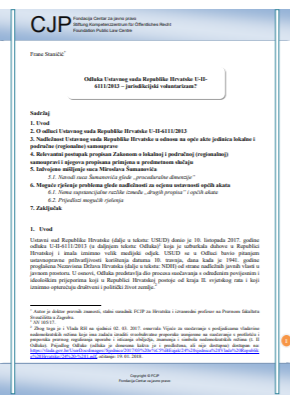
Keywords: Croatia; Constitutional Court; decision; 2013; jurisdictional voluntarism; Miroslav Šumanović; governance;
In this paper the author analyzes the decision U-II-6111/2013 of the Constitutional Court of the Republic of Croatia. In this decision, the Constitutional Court annulled the decision of the Municipality Council renaming a street in Slatinski Drenovac after the date of the proclamation of the Independent State of Croatia in 1941. The Constitutional Court based its jurisdiction, contrary to its earlier jurisprudence, according to the Article 2/1 of the Constitutional Law on the Constitutional Court of the Republic of Croatia, establishing, thus, a general constitutional supervision. One of the judges had a dissenting opinion and the author analyzed the decision and the dissenting opinion. From the analysis the author concluded the following: the Constitutional Court was not in the right assuming jurisdiction in this case as it does not evolve from the Constitution or the Constitutional Law on the Constitutional Court of the Republic of Croatia. The author argues that, in assuming jurisdiction in the manner the Constitutional Court has done in this particular case, the Court created legal uncertainty and acted directly contrary to its established practice and the Constitution, constitutional Law and other laws. The author argues that the explained situation is the consequence of the narrow practice of the Constitutional Court of the Republic of Croatia in defining “other norms” which excluded general acts from the jurisdiction of the Court. Consequently, whenever a need for inspection of general acts arises, the Court has no alternative but to alter its practice. The author argues for a broader definition of “other norms” which would include general acts.
More...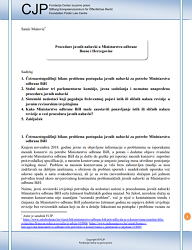
Keywords: public procurement for the BiH Ministry of Defense; 2004-2017; financial statements and financial operations; Supreme Audit Institution; BiH Public Procurement Law;
At the end of November 2018, the official confirmation of the BiH Ministry of Defense appeared in local media was related to the problematic delivery of the canned meat for the Ministry. It was officially confirmed that the inadequate deliveries were already terminated since content of the tested meat-cans confirmed presence of the pork meat in a cans that were marked as the beef meat product in accordance with the manufacturer's declaration. Delivery of the meat cans was forgotten soon, but unfortunately, this case confirmed again a continuity of the multi-annual trend of the questionable public procurement for the BiH Ministry of Defense. Public audit reports confirmed in a 14 years long continuity of the shortcomings related to the procurement procedures performed by the BiH Ministry of Defense. This trend is clearly visible in the attached table (Annex 1) consisted of audit findings related to the public procurement procedures, audit recommendations, and issued auditor’s opinions copied from public audit reports for the BiH Ministry of Defense from 2004. to 2017. Despite to the intensive parliamentary oversight of the BiH Defense Ministry and the BiH Armed Forces performed by the three Committees of the Parliamentary Assembly of Bosnia and Herzegovina (the "Joint Committee for Defense and Security of BiH", and two "Finance and Budget Committees" from both Houses of the Parliamentary Assembly of Bosnia and Herzegovina), Ministry was not able to overcome shortcomings of its public procurement procedures. Even more, the BiH Ministry of Defense from 2004 to 2017 did not received even single positive auditor’s opinion on the annual financial statements and financial operations. For all these years, annual financial statements and financial operations were rated with the “reserved auditor’s opinions” (conditional opinion) except for 2011, when the Ministry received a "negative auditor’s opinion" (negative qualification). In accordance to the new practice, the BiH Supreme Audit Institution published several years back a separate audit report on the “Major annual audit findings and recommendations”27 that covers the most frequent audit findings and the systemic deficiencies as well. It would be very useful for the Ministry to undertake comprehensive analysis of the Chapter “Financial Audit” (3.2.), at least for the three years back, in order to create appropriate comparisons with the audit findings that were addressing deficiencies of the procurement procedures presented here in “Annex 1” (attachment). Moreover, it will be necessary to organize the highest level of internal consideration of the audit recommendations for improvement of the procurement procedures published in annual financial audit reports for the BiH Ministry of Defense. In addition to the internal consideration of the recently received audit recommendations, it will be very important to discuss and to apply the following measures in order to reduce the risks of repetition of the already reported procurement problems of the Ministry of Defense: a) To enable wider participation to the training sessions on the implementation of the “BiH Public Procurement Law” of the majority of staff and the key personnel of the BiH Ministry of Defense, especially for those employees that confirmed their interest in participating to the procurement procedural activities (constant training should reduce risk that procedural mistakes will be repeated due to the incompetence); b) To adopt internal Decision by which any staff member/manager who participated to the procurement procedure that was subject of any chapter of the last audit report (starting from the 2018 budget year) will be banned to participate in any procurement procedure for the period of next three to five years; c) To establish procedure by which any staff member/manager who is going to participate to any procurement teams or to any procurement procedural step, will receive the “engagement decision" that will precisely define his/her work assignments, responsibilities and sanctions for failures and/or for breaches of the legal and procedural obligations. These “engagement decisions" could be standardized in a form of several textual definitions given in the “engagement decision” for the leading member of a working group", for the "working group member" etc., in order to simplify preparations and the execution of the given tasks; d) In cooperation the “Internal Audit Unit”, all public procurement procedures could be segmented by stages and it is possible to define pre-conditions or requirements for the each following stage of the each legally defined procurement procedure. In addition, it is possible to establish internal obligation (the mandatory one) that each procurement stage should be performed in consultation with the internal auditor and/or procurement stages should be certified (approved) by internal auditor (please consider option to learn more about the stage-certification practice active in internal audits of Spain); e) To establish obligatory practice of documenting of each procurement procedure in order to enable follow-ups, to prevent the repetition of the same mistakes, to trace individual responsibilities and to avoid "collective responsibility"; f) To establish prevention measures against of the corruptive misuses of assignments in procurement or misuse of public resources, as well as to establish system of internal sanctions for those individuals or members of the procurement teams who will breach regulations or will try to avoid obligatory steps/procedures; g) In a case that the BiH Ministry of Defense will not succeed to overcome inherited public procurement problems, or will continue with the low level implementation of the audit recommendations related to the public procurement, it will be useful to consider and to initiate adoption of the new legal solutions that will enable “outsourcing” procurement service solution for the BiH Ministry of Defense and for other institutions that were not able to overcome their deficiencies in their procurement for many years back (please consider learn more about the Swedish solutions applied for the public procurement performed by the outsourcing service providers/agencies).
More...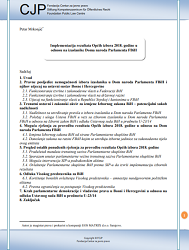
Keywords: Constitutional Court of BiH; electoral legislation; Constitution of the FBiH; Constitution of BiH; House of Peoples of Bosnia and Herzegovina;
The political process of implementing the decision of the Constitutional Court of BiH in the U23/14 case pointed to several critical points in the electoral legislation as well as in the constitutional system as a whole. First, it turned out that there are not clear enough rules on the jurisdiction of the state and the entities to regulate the election process of House of Peoples in FBiH. Consequently, there are simultaneous initiatives to change electoral legislation at the state and entity levels, which undoubtedly leads to a conflict of competencies. Secondly, there is a clear inconsistency between the Constitution of the FBiH, the Election Law of BiH and the Constitution of BiH, so it is very uncertain how the envoys of the FBiH House of Peoples can be elected without breaking a constitution or law at the same time. And third, it turns out that domestic political actors are doing homogenization of the electorate, while they simply leave the High Representative to BiH to solve this legal and political problem. In its persistent refusal to execute and enforce the decisions of the highest court instances, Bosnia and Herzegovina has gone from the point of disregarding fundamental human rights to the danger that it will no longer be a functional state. With careful analysis of the decision of the Constitutional Court of BiH in the case of U-23/14 and the whole spectrum of its implications, it comes to the conclusion that this decision can not be properly implemented by merely modifying the Election Law of BiH. Proper implementation would mean changes to the constitutional structure at the level of FBiH and BiH through the harmonization of these acts and electoral legislation, through a clear delineation in the competencies of certain levels of government and the adaptation of constitutional and legal texts presented by the Constitutional Court's understandings and interpretations. Any changes to the constitutional structure in BiH carry the need for a comprehensive revision of the constitutional structure of all levels of government, including the implementation of other verdicts and decisions such as the Sejdić and Finci cases, Zornić, Pilav and the City of Mostar. Decision U-23/14 could therefore be a catalyst for constitutional changes, as constitutional changes are "necessarily evil" for this decision to be implemented and the state to continue to function. However, it is very certain that the problem will be solved by imposing a High Representative's decision that would become a permanent interim solution and where there would be no comprehensive review of the constitutional structure in BiH and the possibility of constitutional changes.
More...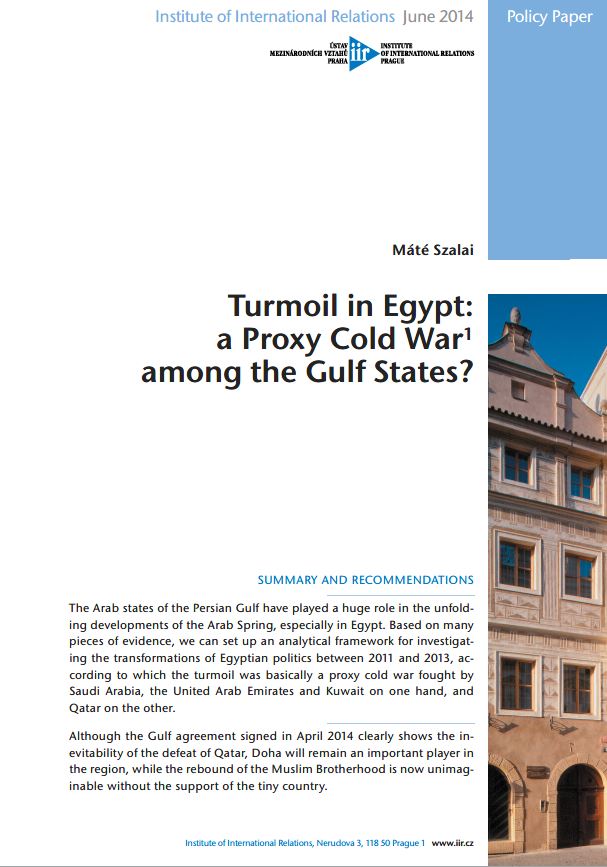
Keywords: Arabian States; development of Arabian spring; Egyptian politics; cold war; Gulf agreement; Muslim Brotherhood;
The Arab states of the Persian Gulf have played a huge role in the unfolding developments of the Arab Spring, especially in Egypt. Based on many pieces of evidence, we can set up an analytical framework for investigating the transformations of Egyptian politics between 2011 and 2013, according to which the turmoil was basically a proxy cold war fought by Saudi Arabia, the United Arab Emirates and Kuwait on one hand, and Qatar on the other. Although the Gulf agreement signed in April 2014 clearly shows the inevitability of the defeat of Qatar, Doha will remain an important player in the region, while the rebound of the Muslim Brotherhood is now unimaginable without the support of the tiny country.
More...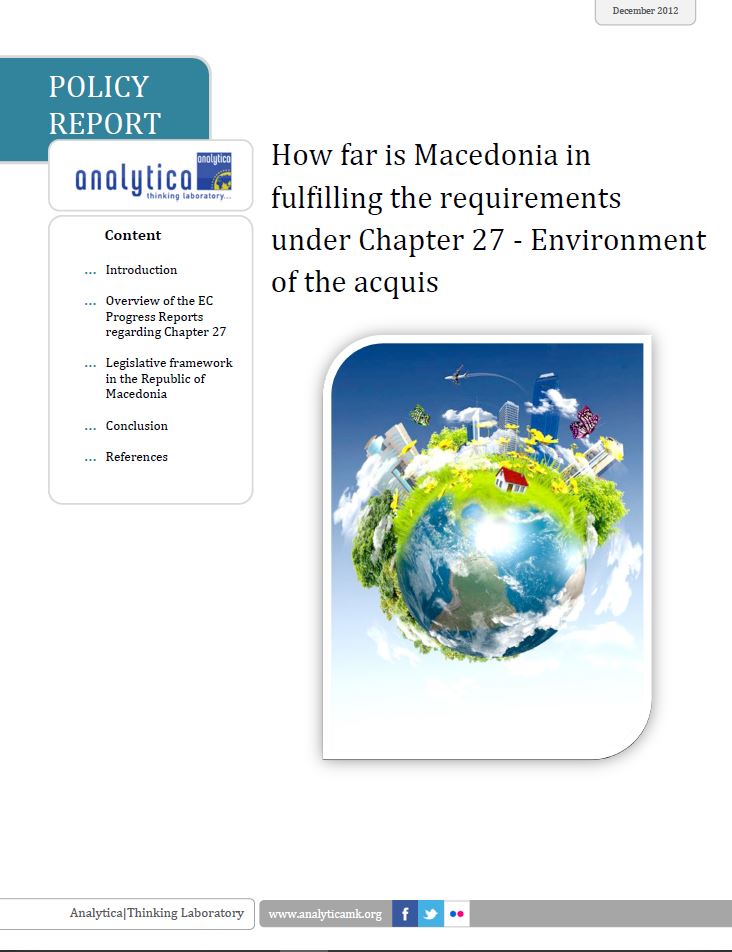
Keywords: North Macedonia; EU integration; chapter 27; Environment and climate change; environmental protection; environmental policy; waste management; air quality; water quality; industrial pollution; noise; forestry; chemicals;
Macedonia’s progress under Chapter 27 of the EU Acquis – Environment and climate change has been one of the slowest since the EC started reporting about the reform processes in the potential candidates and candidates’ member states. The issues in the environmental sector have not been high on the Macedonian government’s agenda due to many other problems taking time and money such as public administration and judicial reforms, police reform, human rights, non-majority communities’ rights etc., which usually take priority over the environment. Although as a candidate for membership Macedonia is obliged to work on reforms in every chapter including this one. Some progress has been made in certain areas such as transposing the acquis into national legislation, in particular on waste management or chemicals. However there is much left to be done, and the general observation is that, the most painful and expensive reforms are yet to be implemented. As it was stated in the last progress report from 2012: considerable efforts are required on awareness-raising, setting a more strategic approach for the country, aligning with and implanting EU climate acquis… Administrative capacity at both central and local levels needs to be strengthened. Investments need to be increased, especially in the waste and water sectors. Overall, preparations in the field of the environment are moderately advanced while in the field of climate change remain at an early stage.
More...
Keywords: Kosovo 2003;Hashim Thaçi;Adem Demaçi;
More...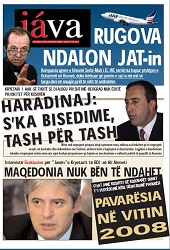
Keywords: Kosovo 2003;Ramush Hardinaj;
More...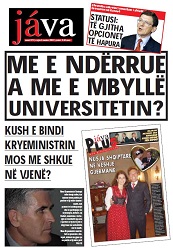
Keywords: Kosovo 2003;
More...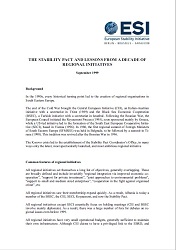
Keywords: political stagnation in Bosnia-Hercegowina; Western Balkans development;
Nearly four years after the Dayton Peace Agreement (DPA) came into force in Bosnia and Herzegovina, the international community finds itself in an untenable position. Frustration with the slow rate of progress has drawn international organisations into the intricacies of decision-making at all levels of the Bosnian political system. However, this increasingly intrusive role is not achieving breakthroughs on substantive issues, or contributing to a self-sustaining peace process. At its last meeting, the Steering Board of the Peace Implementation Council (PIC) remained .deeply worried about the lack of progress. At the same time, the responsible States and international organisations have already begun to transfer scarce resources, both funding and personnel, away from Bosnia to Kosovo and other conflict areas. These factors suggest the need for an urgent reassessment of international strategy and priorities in Bosnia.
More...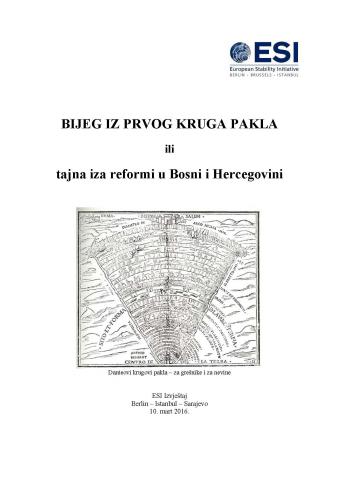
Keywords: Bosnian EU-accession;
One popular idea about Bosnia and Herzegovina among European observers is that Newton’s first law of motion applies to its politics: this law says that an object at rest will stay at rest unless acted upon by an outside force. For Bosnian politics, that outside force has to be the international community. One debate in EU capitals today is whether Bosnia is “ready for the next step.” Now that Bosnians have applied for accession, the EU has an obvious way to find out: to give Bosnia a questionnaire, the first step towards preparing an opinion, without delay. The conventional wisdom that Bosnians cannot coordinate when it comes to EU matters is wrong. The history of relations between Bosnia and the EU since 2000 shows that whenever Bosnian institutions were seriously challenged by the EU to co-ordinate, they were able to do so – to the surprise of their European counterparts, who sometimes acted as though Bosnia was expected to fail. This report explores this history and sets the record straight.
More...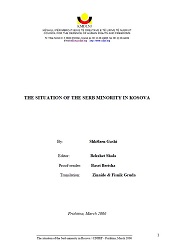
Keywords: Serbs in Kosovo; Kosovo constitution;
Published in March, 2006 by the »Council for the Defence of Human Rights and Freedoms« (Prishtina). // „If we take into consideration the classification of democracy in fictive, formal and real democracy, we can say that Kosova is a country with formal democracy, not to say a country with fictive democracy. This is due to the fact that according to UNMIK Regulation 2001/9 (the Constitutional Framework for Provisional Self-Government) “Twenty (20) of the 120 seats in the Assembly of Kosova shall be reserved for the additional representation of non-Albanian Kosovo Communities”. This is not surprising if we bear in mind the fact that during the ‘90s, out of 130 deputies, who were to be elected in the Assembly of Kosova, only 100 were elected directly, whereas the others were to be elected based on the principle of the proportional representation of the political parties and the adequate representation of the political parties, which draw together members of the national minorities living in the “Republic of Kosova”. // Despite the fact that additional representation is a positive thing, this does mean that the situation of the Serb community in Kosova is satisfactory. On the contrary, in some parts of Kosova, the situation of the Serb community is grave. Positive discrimination may have negative effects in many cases – it seems that it has had such an effect on the Serb community in Kosova“ (Introduction)
More...
Keywords: administrative issues;trust in political leaders;voting intentions;
The survey was conducted between March 6-7, 2020 on a sample of 251 adults living in the city. He measured how the population perceives the involvement of the mayor’s office in various administrative issues, trust in local political leaders, voting intentions in local elections, the perception of local party organizations.
More...
Keywords: administrative issues;trust in political leaders;voting intentions;
The survey was conducted between January 24 and February 10, 2020 on a sample of 3267 adults living in the county. He measured how the population perceives the involvement of the mayor’s office in various administrative issues, trust in local political leaders, voting intentions in local elections, the perception of local party organizations.
More...
Keywords: administrative issues;trust in political leaders;voting intentions;
The survey was conducted between December 6-9, 2019 on a sample of 840 adults living in the city. He measured how the population perceives the involvement of the mayor’s office in various administrative issues, trust in local political leaders, voting intentions in local elections, the perception of local party organizations.
More...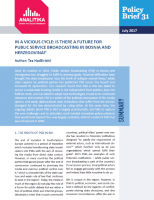
Keywords: BiH; media; public service broadcasting; finances; politics;
Since its creation in 2002, Public Service Broadcasting (PSB) in Bosnia and Herzegovina has struggled to fulfil its primary goals. Financial difficulties have brought the state broadcaster near the brink of collapse several times, while state capture by political parties has politicized PSB across the board2 and increased its dysfunction. Our research found that PSB in BiH has failed to secure a sustainable funding model, is not independent from politics, does not fulfil its remit, and has failed to adopt new technologies crucial to its continued relevance and survival. PSB is a victim of the political colonization of the media sphere, and weak, dysfunctional state institutions that suffer from the chronic disregard for the law demonstrated by ruling elites. At the same time, the ongoing debate about PSB in BiH is largely anachronistic, and fails to capture the core challenges and to articulate much needed innovative policy solutions that would look beyond the now largely outdated, defunct model of PSB that was introduced in 2002.
More...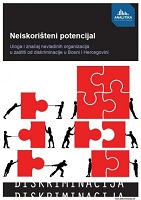
Keywords: BiH; discrimination; protection; NGO; civil society; role; importance;
Usvajanjem Zakona o zabrani diskriminacije (u daljnjem tekstu: ZZD) u julu 2009. godine dopunjen je postojeći antidiskriminacioni okvir u Bosni i Herce govini. Time se i Bosna i Hercegovina priključila širokom krugu država koje eliminaciju diskriminacije nastoje da obezbijede kroz usvajanje sveobuhvatnog antidiskriminacionog zakonodavstva kojim se omogućava sudska zaštita od diskriminacije počinjene kako od države i njenih organa tako i od privatnih lica. Ovaj značajni zakon, pored ostalog, prepoznaje važnu ulogu koju nevladine organizacije mogu da odigraju na polju borbe protiv diskriminacije priznajući im, između ostalog, i određene procesne uloge u sudskom postupku za zaštitu od diskriminacije. Na međunarodnom i komparativnom planu, kao jedna od najznačajnijih aktivnosti nevladinih organizacija na polju borbe protiv diskriminacije ističe se njihova uloga u postupcima za zaštitu od diskriminacije. Razlog davanja mogućnosti organizacijama civilnog društva da učestvuju u postupcima za zaštitu od diskriminacije, u suštini, leži u činjenici da suzbijanje diskriminacije predstavlja djelatnost od javnog interesa, te da svaki dobro uređen sistem za zaštitu od diskriminacije treba da sadrži različite modalitete učešća nevladinih organizacija u postupcima za zaštitu od diskriminacije. Stoga djelovanje NVO-a u postupcima za zaštitu od diskriminacije možemo označiti kao specifičan vid parničenja u javnom interesu. Poseban značaj NVO-ima u ovom domenu, barem u zemljama Evropske unije, dale su direktive u oblasti diskriminacije, koje od država zahtijevaju da u svojim pravnim sistemima, u cilju obezbjeđivanja što efikasnije zaštite od diskriminacije, omoguće nevladinim organizacijama da djeluju u ime žrtava diskriminacije ili kao podrška ovim osobama u postupcima povodom zaštite od diskriminacije. Ove procesne uloge nevladinih organizacija su različito regulisane u različitim pravnim sistemima. Ipak, kao moguće oblike djelovanja nevladinih organizacija u ime žrtve generalno možemo da izdvojimo podnošenje tužbe u ime i za račun žrtve – dakle, pravno zastupanje, mogućnost pojavljivanja nevladine organizacije kao sutužioca uz žrtvu ili, pak, kao samostalnog nosioca tužbe uz pristanak žrtve. Pored navedenog, kao specifičan način djelovanja za račun žrtava diskriminacije izdvajaju se aktivnosti nevladinih organizacija u pravcu podnošenja kolektivne ili grupne tužbe. Veoma važan oblik podrške žrtvama diskriminacije u postupcima povodom diskriminacije svakako je i učešće organizacija civilnog društva kao umješača u postupku na strani žrtve ili, pak, kao prijatelja suda (amici curiae). Na kraju, jedan od ključnih doprinosa nevladinih organizacija u oblasti borbe protiv diskriminacije nesumnjivo je i njihova uloga u takozvanim strateškim parnicama pokrenutim radi obezbjeđenja podrške implementaciji antidiskriminacionih zakona ili rasvjetljavanju različitih koncepata sadržanih u antidiskriminacionom pravu. Imajući u vidu navedeno, ovaj izvještaj nastoji da analizira postojeća zakonska rješenja u svjetlu komparativnih iskustava te da ukaže na prepreke koje stoje na putu aktivnijem angažmanu nevladinih organizacija u sudskim postupcima za zaštitu od diskriminacije. Pored toga, izvještaj nastoji da ponudi određena rješenja koja bi dodatno motivisala nevladine organizacije da aktivno koriste procesne uloge koje su im dodijeljene ZZD-om, a u najboljem interesu žrtava diskriminacije. Izvještaj je prevashodno zasnovan na sekundarnom, komparativnom istraživanju fokusiranom na ulogu, aktivnosti i najbolju praksu organizacija civilnog društva u sudskom postupku zaštite od diskriminacije. Pored toga, analizirana su relevantna zakonska rješenja koja se tiču procesne uloge nevladinih organizacija u sudskom postupku zaštite od diskriminacije, kao i prve presude u predmetima diskriminacije u Bosni i Hercegovini. Analiza usvojenih zakonskih rješenja u Bosni i Hercegovini je izvršena u svjetlu komparativnih iskustava, prije svega iskustava zemalja u okruženju, s obzirom na to da upravo one sa Bosnom i Hercegovinom dijele sličnu pravnu tradiciju i slične probleme, ali i zemalja Evropske unije kojima se Bosna i Hercegovina nastoji pridružiti. Analiza je obuhvatila i druge slučajeve kada je to bilo potrebno radi odgovora na konkretna pitanja. Na kraju, konsultovani su i dostupni izvori o aktuelnom stanju u nevladinom sektoru u Bosni i Hercegovini, sa posebnim fokusom na organizacije koje se bave zaštitom ljudskih prava. U svom prvom dijelu, ovaj izvještaj analizira rješenja predviđena Zakonom o zabrani diskriminacije Bosne i Hercegovine u pogledu procesne uloge nevladinih organizacija u postupku antidiskriminacione zaštite. Drugi dio se fokusira na prepreke koje organizacijama civilnog društva onemogućavaju da se aktivnije uključe u sudske postupke za zaštitu od diskriminacije. Kroz pregled komparativnih iskustava, nastoji se ukazati na najvažnije uslove i kriterije za efikasno korišćenje opcije učešća nevladinih organizacija u postupku antidiskriminacione zaštite u Bosni i Hercegovini. Konačno, u zaključnim razmatranjima sumiraju se zapažanja ove analize te formulišu određene preporuke u pogledu zakonodavnih i praktičnih rješenja u ovoj oblasti u Bosni i Hercegovini.
More...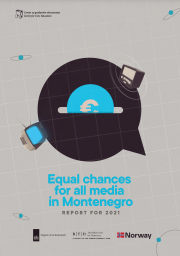
Keywords: Montenegro; media; public finances; expenditures; policy; public service broadcasting; marketing; 2021; report;
The media scene in Montenegro, for a long period, reflects a deep social polarization, accompanied by numerous problems that, in different manners, affect the environment in which the media function as well as the quality of media reporting. The problems of hard censorship are particularly emphasized, as reflected in the burden of unsolved cases of attacks on journalists and their property. This is accompanied by the dysfunctionality of self-regulatory bodies and regulators - the Agency for Electronic Media, but also the public service media RTCG that fails to genuinely transform itself, and even takes a few steps backward, which consequently limits the opportunities for citizens to be objectively informed about events in Montenegro.
More...